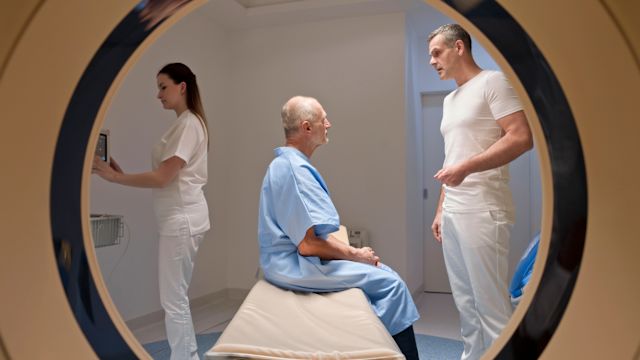Updated on January 31, 2025
Renal cell carcinoma (RCC) is a type of cancer that affects the kidneys, a pair of fist-sized organs located on either side of the lower back, between the top of the hip and the bottom of the ribcage. This type of cancer is common among Americans—kidney cancer in general is among the ten most common cancers in the United States, and more than 90 percent of kidney cancers are RCC.
The kidneys act as filters for the body. As blood passes through the kidneys, waste, excess fluid, and other unneeded substances are removed and become urine. Fluid, nutrients, and other substances the body needs are redirected back into the bloodstream.
RCC begins in the part of the kidney that returns fluid and substances to the bloodstream, very small tubes called the renal tubules. RCC begins when cells that line the renal tubules undergo genetic mutations (changes to DNA). These mutations create abnormal cells that multiply in an uncontrolled way and form tumors.
In the early stages of RCC, a person may not have any noticeable symptoms that indicate something is wrong. Because RCC can be asymptomatic, many cases are not diagnosed until the cancer has advanced.
How is RCC staged?
In most cases, RCC will be staged using the TNM staging system:
- T refers to the size of the primary tumor and if the primary tumor is growing into nearby structures around the kidney.
- N refers to lymph node involvement. Lymph nodes are small pea-sized organs located throughout the body. These organs act as filters for a type of fluid found throughout the body, called lymph fluid. Cancer cells that break away from a tumor can end up in lymph nodes and form new tumors.
- M refers to metastasis. Metastatic RCC has spread beyond the kidney to distant sites in the body, such as distant lymph nodes or other organs.
What is advanced renal cell carcinoma?
RCC is considered advanced when the cancer cannot be completely removed with surgery or destroyed with another type of local therapy, such as radiation therapy. This includes some stage III cancers, non-metastatic stage IV cancers, and metastatic cancers (which are all stage IV).
What is the treatment for advanced RCC?
Treatment for advanced renal cell carcinoma will depend on a variety of different factors about the cancer and about the person being treated for RCC.
The main treatments for advanced RCC are targeted therapies and immunotherapies:
- Targeted therapies are anti-cancer drugs that help stop the cancer from growing. Many targeted therapies for RCC block proteins that tumors need to create new blood vessels. Others work by blocking a protein that helps cancer cells divide.
- Immunotherapies help the body’s immune system recognize and attack cancer cells. With RCC, immune checkpoint inhibitors are often used. These drugs contain substances that attach to cancer cells, which marks these cells as something the immune system should destroy.
When possible, treatment may include surgery to remove the tumor, the kidney, other affected tissues, and metastatic tumors. Though less common, radiation and other procedures to destroy tumors may be used.
Managing and relieving symptoms caused by advanced RCC, including pain, are also an important aspect of treatment. When starting any treatment, it’s important to have a good understanding of how the treatment works and the goal of using this treatment. Your healthcare providers will be your best source of information.





